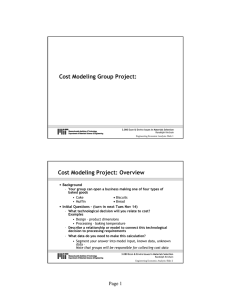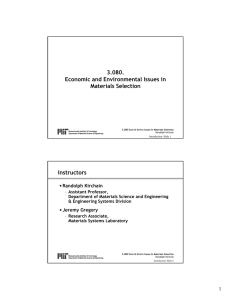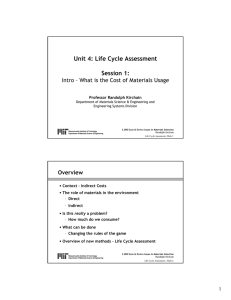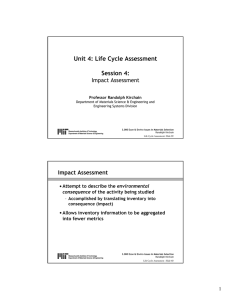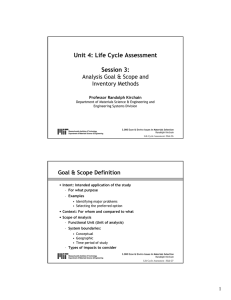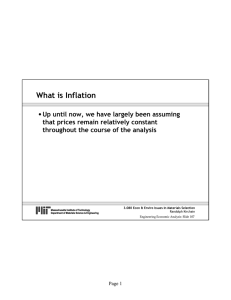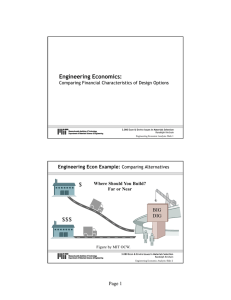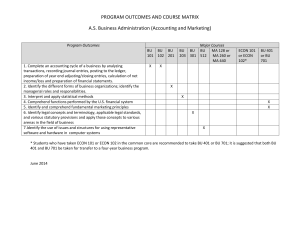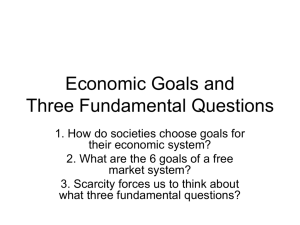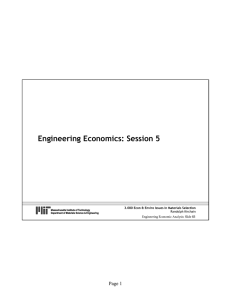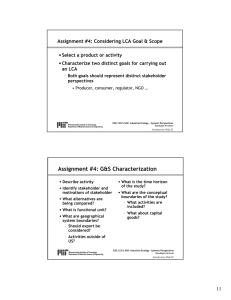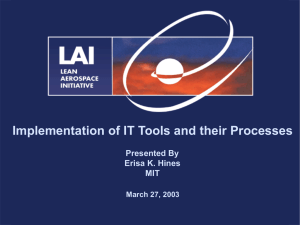Engineering Economics: Session 2 Randolph Kirchain
advertisement
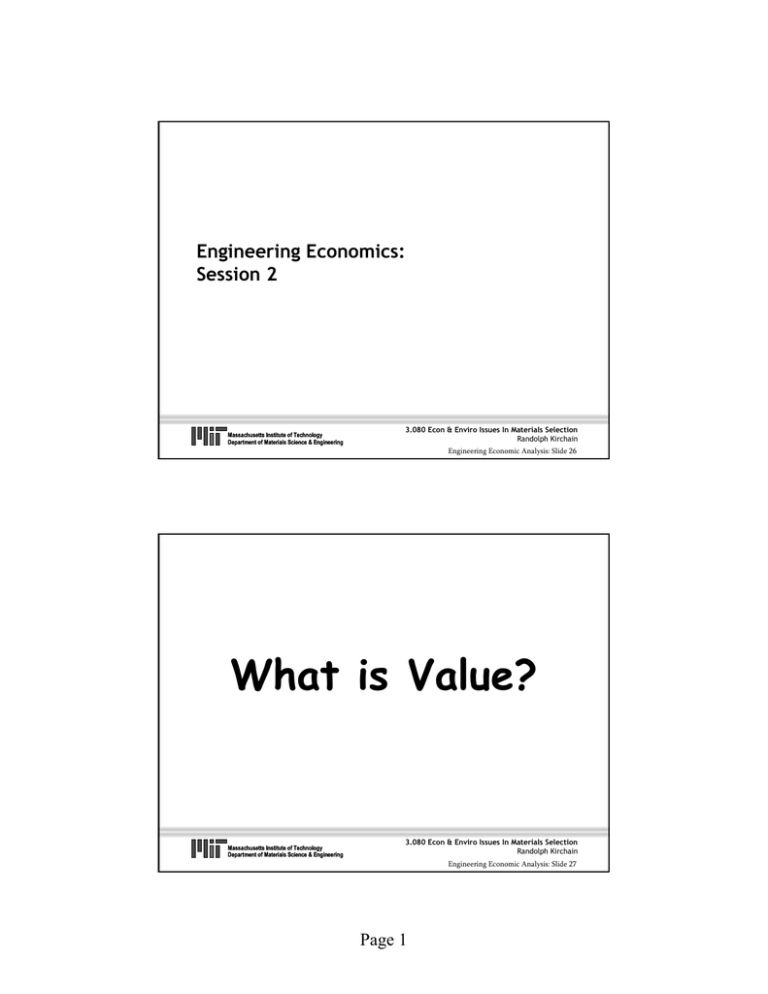
Engineering Economics: Session 2 Massachusetts Institute of Technology Department of Materials Science & Engineering 3.080 Econ & Enviro Issues In Materials Selection Randolph Kirchain Engineering Economic Analysis: Slide 26 What is Value? Massachusetts Institute of Technology Department of Materials Science & Engineering 3.080 Econ & Enviro Issues In Materials Selection Randolph Kirchain Engineering Economic Analysis: Slide 27 Page 1 Review: Cash Flow Equivalence Uniform Series Single Type Notation Formula Compound Amount (F/P,i,N) Present Worth (P/F,i,N) Compound Amount (F/A, i, N) F = P(1 + i) N ⎛ (1 + i ) N − 1 ⎞ F = A⎜ ⎟ i ⎝ ⎠ Sinking Fund (A/F, i, N) ⎛ ⎞ i A= F⎜ ⎟ N ⎝ (1 + i ) − 1 ⎠ Present Worth (P/A, i, N) ⎛ (1 + i ) N − 1 ⎞ P = A⎜ N ⎟ ⎝ i (1 + i ) ⎠ Capital Recovery (A/P, i, N) ⎛ i (1 + i ) N ⎞ A = P⎜ ⎟ N ⎝ (1 + i ) − 1 ⎠ Excel P = F /(1 + i ) N 3.080 Econ & Enviro Issues In Materials Selection Randolph Kirchain Massachusetts Institute of Technology Department of Materials Science & Engineering Engineering Economic Analysis: Slide 28 Single Payment Example Finding P given F • An investor can purchase land that will be worth $10k in 6 years • If the investor’s discount rate is 8%, what is the max they should pay today? P = F ( P / F, i, N ) = F (1+ i) N $10, 000 (1+ 0.08)6 = $10, 000 ⋅ 0.6302 = = $6, 300 Massachusetts Institute of Technology Department of Materials Science & Engineering 3.080 Econ & Enviro Issues In Materials Selection Randolph Kirchain Engineering Economic Analysis: Slide 29 Page 2 Single Payment Example Solving for i or N P(1 + i )10 = 2 P • What rate of (1 + i )10 = 2 return will you need to double your investment in 10 years? ln(1 + i )10 = ln(2) 10iln(1 + i ) = ln(2) e F = P ( F / P, i, N ) = P(1 + i ) ln(1+ i ) =e 1+ i = e N i=e ln( 2) 10 ln( 2) 10 ln( 2) 10 −1 i = 7.2% 3.080 Econ & Enviro Issues In Materials Selection Randolph Kirchain Massachusetts Institute of Technology Department of Materials Science & Engineering Engineering Economic Analysis: Slide 30 Single Payment Example Solving for i or N P(1 + 0.08) N = 2 P • How many years (1.08) N = 2 must elapse for an investment to double at a rate of return of 6%? ln(1.08) N = ln(2) N iln(1.08) = ln(2) ln(2) ln(1.08) N =9 N = F = P( F / P, i, N ) = P(1 + i ) N Massachusetts Institute of Technology Department of Materials Science & Engineering 3.080 Econ & Enviro Issues In Materials Selection Randolph Kirchain Engineering Economic Analysis: Slide 31 Page 3 Discount Rate Approximation: “Rule of 70 or 72” • To approximate effect of discounting: “Rule of 72” or “Rule of 70” – Number of years to double = 70 / Interest rate (in percent) P(1 + i ) N = 2 P for small x ln(1 + x) ≈ x (1 + i ) N = 2 ∴ ln(1 + i ) N = ln(2) N iln(1 + i ) = ln(2) ln(2) N = ln(1 + i ) Massachusetts Institute of Technology Department of Materials Science & Engineering N≈ ln(2) 0.69 ≈ i i 70 N≈ i% 3.080 Econ & Enviro Issues In Materials Selection Randolph Kirchain Engineering Economic Analysis: Slide 32 Discount Rate Approximation: “Rule of 70 or 72” • To approximate effect of discounting: “Rule of 72” or “Rule of 70” – Number of years to double = 70 / Interest rate (in percent) • Examples – When would $1000 invested at 10% double? Rule Æ 7.2 years Actual Æ 7.273 – What is the value of $1000 in 8 years, at 9%? Rule Æ $2,000 Actual Æ $1,993 Massachusetts Institute of Technology Department of Materials Science & Engineering 3.080 Econ & Enviro Issues In Materials Selection Randolph Kirchain Engineering Economic Analysis: Slide 33 Page 4 Discount Rate Approximation: “Rule of 70 or 72” Mapping Interest Rate and Periods to Double 12% Period Interest Rate 11% 10% Rule Actual 9% 8% 7% 6% 5% 4% 5 10 15 Number of Periods Massachusetts Institute of Technology Department of Materials Science & Engineering 20 3.080 Econ & Enviro Issues In Materials Selection Randolph Kirchain Engineering Economic Analysis: Slide 34 Review: Finite Series of Equal Payments a) Future Value (F) N = ∑ A(1 + r )i i [(1 + r )N - 1] r b) Payment (A) P =A [(1+r) N ] [(1 + r) N -1] A A … 0 = P×r A A A N-1 N = P (crf) crf = Capital Recovery Factor Massachusetts Institute of Technology Department of Materials Science & Engineering 3.080 Econ & Enviro Issues In Materials Selection Randolph Kirchain Engineering Economic Analysis: Slide 35 Page 5 Using the Compound Amount Factor: Finding F, Given i, A, N • Suppose: – You put $3k into savings for 10 years (@end of ea. yr) – Your savings account earns 7% – What is your account worth after 10years? F = A( F / A, i, N ) ⎛ (1 + i) N −1 ⎞ = A⎜ ⎟ i ⎝ ⎠ ⎛ (1.07)10 −1 ⎞ = $300 ⎜ ⎟ ⎝ 0.07 ⎠ = $300(13.82) = $4,145 Massachusetts Institute of Technology Department of Materials Science & Engineering Engineering 3.080 Econ & Enviro Issues In Materials Selection Randolph Kirchain Engineering Economic Analysis: Slide 36 Using the Capital Recovery Factor: Finding A, given P • Suppose: – Your firm purchases lab equipment for $250k – The loan’s interest rate is 8% – What payment will repay the loan? A =P( A / P, i, N ) ⎛ i(1 + i) N ⎞ = P⎜ ⎟ N ⎝ (1 + i) −1 ⎠ ⎛ 0.08(1.08)6 ⎞ = $250, 000 ⎜ ⎟ 6 ⎝ (1.08) −1 ⎠ = $250, 000(0.2163) = $54, 075 Massachusetts Institute of Technology Department of Materials Science & Engineering Engineering 3.080 Econ & Enviro Issues In Materials Selection Randolph Kirchain Engineering Economic Analysis: Slide 37 Page 6 Other Special Cases: Linear Gradient of Cash Flows (n-1)G • Series of cash flows changing by (n-2)G uniform amount per period. 3G No payment @ P1 2G G ..… 0 1 2 3 n-2 4 n-1 n 3.080 Econ & Enviro Issues In Materials Selection Randolph Kirchain Massachusetts Institute of Technology Department of Materials Science & Engineering Engineering Economic Analysis: Slide 38 Deriving Equivalence for a Linear Gradient of Payments P = 0+ G 2G ( N − 1)G + + ... + 2 3 (1 + i ) (1 + i ) (1 + i ) N (n − 1)G n n (1 + i ) Let x = 1/(1 + i ) N P=∑ P = 0 + ax 2 + 2ax3 + ... + ( N − 1)ax N P = ax(0 + x + 2 x 2 + ... + ( N − 1) x N −1 ) ⎡1 − Nx N −1 + ( N − 1) x N ⎤ 0 + x + 2 x 2 + ... + ( N − 1) x N −1 = x ⎢ ⎥ (1 − x) 2 ⎣ ⎦ ⎛ (1 + i ) N − iN − 1 ⎞ P = G⎜ ⎟ 2 N ⎝ i (1 + i ) ⎠ Massachusetts Institute of Technology Department of Materials Science & Engineering 3.080 Econ & Enviro Issues In Materials Selection Randolph Kirchain Engineering Economic Analysis: Slide 39 Page 7 Other Special Cases: Geometric Series Payment grows from an amount A1 by g% per period 160 140 – An = A1(1+g)n-1 – If g>0, series grows – If g<0, series shrinks 120 100 80 60 40 20 0 0 1 2 3 4 5 6 7 Massachusetts Institute of Technology Department of Materials Science & Engineering 8 9 10 11 12 13 14 15 16 17 18 19 20 3.080 Econ & Enviro Issues In Materials Selection Randolph Kirchain Engineering Economic Analysis: Slide 40 Geometric Gradient of Payments G 2G (N −1)G P = 0+ 2 + + ... + 3 (1 + i) (1+ i) (1+ i) N N P = ∑ A1 n=1 (1 + g) n−1 (1 + i) n ⎧ ⎛ 1 − (1 + g) N (1+ i) − N ⎞ ⎪ A1 ⎜ ⎟ ,if i ≠ g i−g ⎪ ⎝ ⎠ P=⎨ NA1 ⎪ ,if i = g ⎪⎩ (1 + i) Massachusetts Institute of Technology Department of Materials Science & Engineering 3.080 Econ & Enviro Issues In Materials Selection Randolph Kirchain Engineering Economic Analysis: Slide 41 Page 8 Example Problem: Geometric Series • Facility has aging cooling system which currently runs 70% of the time the plant is open – Pump will only last 5 more years. As it deteriorates, the pump run time is expected to increase 7% per year • New cooling system would only run 50% of the time • Assumptions – Either pump uses 250 kWh, Electricity cost $0.05/KWh – Plant runs 250 days per year, 24 hours per day – Firm’s discount rate is 12% • What is the value of replacing the pump? Massachusetts Institute of Technology Department of Materials Science & Engineering 3.080 Econ & Enviro Issues In Materials Selection Randolph Kirchain Engineering Economic Analysis: Slide 42 Example Problem: Geometric Series • Current pump ⎛ 1− (1.07) (1.12) power cost = POld = $52, 500 ⎜ 70% x 250kWh x 0.12 − 0.07 ⎝ $0.05/kWh x 250 = $214, 360 days x 24 PNew = $37, 500(P / A,12%, 5) hrs/day = $52,500 • New pump power Cost = $37,500 5 −5 PNew = $37, 500(3.605) = $135, 200 Value = POld − PNew = $79,160 Massachusetts Institute of Technology Department of Materials Science & Engineering 3.080 Econ & Enviro Issues In Materials Selection Randolph Kirchain Engineering Economic Analysis: Slide 43 Page 9 ⎞ ⎟ ⎠
